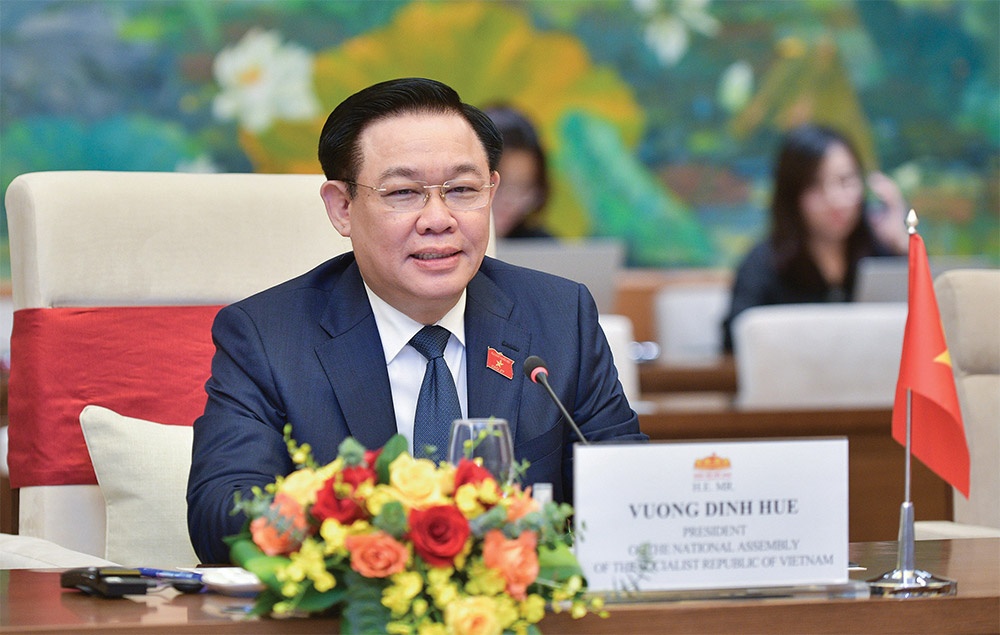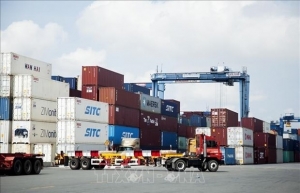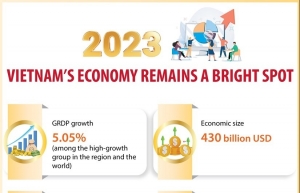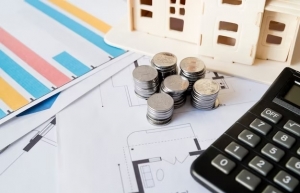Soft and smart management of fresh legislation
What were the most outstanding outcomes in the National Assembly’s (NA) legislative and supervisory activities last year, and decisions on vital issues of the country?
 |
| Chairman of the National Assembly Vuong Dinh Hue |
In 2023, the NA had the largest workload and activities in this term. Under the regulations in the Constitution, the NA has two sessions each year, but in 2023 there were five, including two regular sessions and three extraordinary sessions, not including the fifth extraordinary one in January 2024.
The NA Standing Committee meets once a month, but there are also many additional sessions, with a total number of 16-17 sessions in the year, including many specialised sessions on different issues.
The NA must not only strive to be increasingly professional and promote democracy, but must also be very flexible, adapt to the real needs of the society, and closely follow the real situation of the country. At the end of 2023, I met Vietnamese ambassadors attending a diplomatic conference, and they highly appreciated the Vietnamese legislature, which is dynamic and innovative, and shares the wishes of individuals, businesses, and the government.
What were the biggest highlights in the legislative work in 2023?
The NA continued the legislative work with the spirit of proactivity and facilitation in a long-term vision.
Besides solving immediate difficulties via a resolution allowing piloting of some urgent issues, the lawmaking work still carried a long-term vision towards two 100-year goals: 100 years of the Party’s founding anniversary and 100 years of establishing the country.
The legal system must still maintain its role as one of three strategic breakthroughs, demonstrating the spirit of development and deep international integration.
In 2023, the NA adopted 16 bills and six law-level resolutions, while discussed 10 bills. It also passed one ordinance and 10 ordinance-level resolutions. By the end of 2023, 114 out of 137 legislative tasks for the entire term were completed. Thus, in the mid-term, the NA has completed over 83 per cent of the legislative work of the whole term.
In last year’s legislative work, there were outstanding events, such as the promulgation of a resolution on the imposition of top-up corporate income tax of 15 per cent under the Global Anti-Base Erosion model rules. This resolution is likened to a law.
At the same time, the NA also issued a resolution allowing the establishment of an investment support fund. Funding will be sourced from the collection of the global minimum tax and other legal sources such as the state budget, savings from expenses, and excess revenues in order to assist investment for strategic groups and projects.
Last year, you said the NA will continue to supervise the government to ensure safety in the financial and monetary market. Could you elaborate on the progress thus far?
In 2023, the NA and its agencies continued to supervise financial and monetary safety in many fields. The NA clearly stated the requirement to synchronously implement solutions to remove difficulties and strengthen management and supervision of the markets of currency, stock, insurance, corporate bonds, and real estate.
It was necessary to urgently handle shortcomings in corporate bond investment consultancy, brokerage, and cross-selling of life insurance when loan applications are considered and approved.
In particular, the NA required a comprehensive inspection over the life insurance market, with a focus laid on investment-linked insurance, strictly controlling the provision of credits using capital, and protecting the interests of investors in line with the law.
The NA also requested the research and development of criteria and methods to determine credit growth limits for credit institutions. A focus was placed on resolving long-lasting loss-making projects, and banks and businesses that have committed violations, so as not to prevent further losses. After that, NA agencies have increased supervision according to their areas of responsibility. The life insurance sales situation of banks has been greatly improved.
In another case, the National Assembly Finance and Budget Committee conducted supervision and explanation on VAT refunds. Tax refunds are improved, both ensuring smooth capital return for businesses and preventing tax and invoice fraud.
This year, the NA will conduct supreme supervision of the implementation of fiscal and monetary policies used for supporting the Programme on Socioeconomic Recovery and Development, and also do the same for the deployment of the NA’s resolutions on a number of important national projects.
In particular, the NA will also place supreme supervision on the implementation of policies and laws on real estate market management and social housing development. These two markets link with very closely with the financial and monetary markets, the corporate bond market, loans, and capital mobilisation from banks.
Besides supervision, the biggest task is to amend the Law on Credit Institutions. In this process, the limitations and weaknesses of the banking system and legal gaps are fully identified and thoroughly dissected. This amendment aims to build a healthy banking and credit institution system, ensuring system safety, increasing resilience, and withstanding internal and external shocks in the economy.
No-one can understand credit institutions and banks better than the banks themselves, so the NA must respectfully listen to the opinions of the State Bank of Vietnam (SBV) governor and credit institutions. However, in the market economy, self-reliance and self-responsibility of business entities are very important. It is not possible for one person to work and the other person to take responsibility. We must tighten financial discipline to avoid a situation where credit institutions can operate freely and push all risks to the economy, the people, and the state.
The state only creates a favourable investment and business environment, and provides technical support. This revision to the credit institutions law must be in line with international practice. The SBV must make early intervention as soon as there are signs of insecurity, and most credit institutions must take responsibility themselves.
What should be done in 2024 for the economy to improve its capital absorbability?
Currently, the economy’s capital absorbability remains limited. Specifically, despite some improvements in public investment disbursement, they have yet to reach expectations. Meanwhile, private investment still faces many bottlenecks, and though registered capital from foreign direct investment has increased significantly, the actual disbursed capital is limited, and the same is also true to disbursement of official development assistance. Never have lending rates at banks reduced as sharply as they do now, but capital cannot flow into the economy remarkably.
Of course, banks have their own reasons. They cannot sacrifice credit standards to meet the capital requirements of businesses in any way. Businesses themselves must also think about why they are not eligible to access credits. As a matter of fact, credit conditions must be very flexible at different points of time.
Managing monetary or fiscal policy must be soft and smart. Sometimes reducing taxes aims to increase budget revenue, not just worrying that tax reduction will lead to a reduction in such revenue.
An important task for this year is to enhance and improve the capital absorbability of the whole economy. This is related to law enforcement and the responsibility of civil servants and public employees. With the same policy, it must be understood why some localities are still developing, with capital still flowing, while others are not.
In another case, when it comes to public investment, some ministries, sectors, and localities cannot disburse, but some places do not have the money to disburse. This requires a review of staff work.
However, it can be said that the economy has gone through the most severe challenges, and the resilience of Vietnamese people and businesses is strong. Once we gain momentum, the economy will bounce back rapidly. Although there are still many difficulties, in 2024 we will still have many opportunities.
I believe that with the foundation that we have established, the most difficult time for some markets has elapsed. The economy will regain growth momentum to recover stronger in the new year, completing all the targets that have been set by the NA for the 2024 plan.
 | Vietnamese economy likely to expand by 6.5 per cent in 2024: Economist The Vietnamese economy is likely to expand by 6-6.5 per cent in the base scenario, with even recovery recorded in all sectors of agriculture, industry, construction and services, Dr. Can Van Luc, a member of the National Financial-Monetary Policy Advisory Council, has predicted. |
 | Vietnam’s economy remains a bright spot in 2023 The trend towards economic recovery continued in Vietnam, with each successive month revealing further improvements over the previous month and each subsequent quarter surpassing the prior quarter. The country essentially achieved its overall goals and posted significant results in various sectors. It remained a bright spot amid a rather challenging global economic landscape. |
 | Central bank policies will address modest slowdown The global economy currently presents a complex landscape, marked by both challenges and opportunities. From the modest slowdown in global growth to the burgeoning economic sectors in various regions, the picture is as varied as it is interconnected. |
What the stars mean:
★ Poor ★ ★ Promising ★★★ Good ★★★★ Very good ★★★★★ Exceptional
Related Contents
Latest News
More News
- Hermes joins Long Thanh cargo terminal development (February 04, 2026 | 15:59)
- SCG enhances production and distribution in Vietnam (February 04, 2026 | 08:00)
- UNIVACCO strengthens Asia expansion with Vietnam facility (February 03, 2026 | 08:00)
- Cai Mep Ha Port project wins approval with $1.95bn investment (February 02, 2026 | 16:17)
- Repositioning Vietnam in Asia’s manufacturing race (February 02, 2026 | 16:00)
- Manufacturing growth remains solid in early 2026 (February 02, 2026 | 15:28)
- Navigating venture capital trends across the continent (February 02, 2026 | 14:00)
- Motivations to achieve high growth (February 02, 2026 | 11:00)
- Capacity and regulations among British areas of expertise in IFCs (February 02, 2026 | 09:09)
- Transition underway in German investment across Vietnam (February 02, 2026 | 08:00)

 Tag:
Tag:


















 Mobile Version
Mobile Version